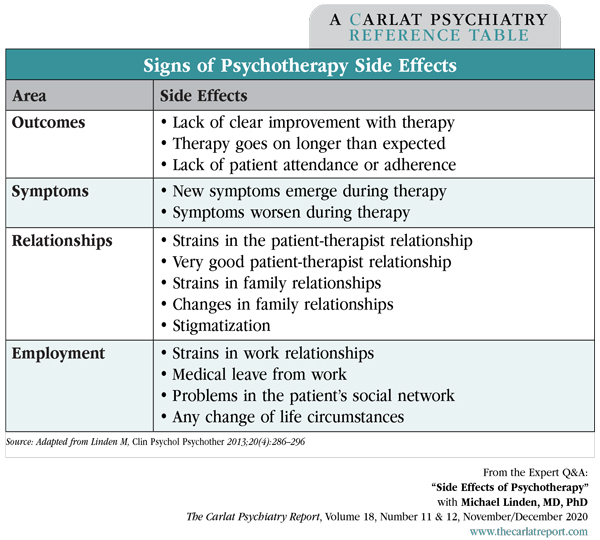Side Effects of Psychotherapy
 Michael Linden, MD, PhD
Michael Linden, MD, PhD
Professor of psychiatry and director of psychosomatic research at the Charité University Medicine Berlin, Germany. Dr. Linden has dual training as a psychologist and psychiatrist and is licensed as a cognitive behavior therapist. He has helped develop new branches of CBT, and his research has brought recognition to the potential side effects of psychotherapy.
Dr. Linden has disclosed that he has no relevant financial or other interests in any commercial companies pertaining to this educational activity.
TCPR: What are side effects to psychotherapy?
Dr. Linden: Side effects are adverse reactions to a therapy that is correctly applied.
TCPR: Why do you say “correctly” applied?
Dr. Linden: When I talk about side effects, I’m not talking about boundary violations or mistakes by the therapist. I’m talking about unwanted events that are caused by the treatment. Side effects are common negative effects that occur in all psychotherapies just as they do with most medical therapies. Now, there are many unwanted events that can happen over a course of psychotherapy, and it can be challenging to figure out which ones are caused by the therapy. The patient may get divorced or get into conflicts at work. New symptoms may emerge, or they may not respond to the treatment.
TCPR: Can you give an example of side effects?
Dr. Linden: To start with, it can be burdensome to talk about one’s problems and one’s own insufficiency. A patient may also go to therapy with an isolated problem, say conflict with their spouse. As they talk about the marital stress, the therapist shifts the focus toward negative events in the patient’s history, and soon the patient feels that their whole life has been a mess. That’s demoralizing.
TCPR: How common are therapy side effects?
Dr. Linden: Studies that used detailed assessments have shown that 100% of patients experience some burden with psychotherapy. Most of these are not serious or lasting. Relevant side effects that are serious or lasting are reported in about 10% of cases (Linden M and Schermuly-Haupt ML, World Psychiatry 2014;13(3):306–309).
TCPR: Are these side effects linked to specific techniques or just to therapy in general?
Dr. Linden: Most are linked to special interventions. Anxiety provocation during exposure therapy can increase anxiety. Early debriefing after a trauma can increase the rate of PTSD. Group therapy can demoralize patients when they hear negative reports from other patients whom they identify with. Even psychoeducation can overwhelm patients in ways that demoralize them and reduce their understanding (Schneibel R et al, Acta Psychiatr Scand 2017;136(3):247–258; Linden M and Wasilewski J, Cogent Psychology 2019;6(1):1612825).
TCPR: Are some patients at greater risk for side effects?
Dr. Linden: We don’t have good data on that, but I think it depends on the therapist-patient match. Patients who are suggestible may be prone to the induction of false memories. Patients with unstable somatic symptoms may be prone to increased anxiety under exposure treatment. Patients with dependent personalities may develop dependency on therapy. The stage of the illness may also play a role in how therapy works. There was a study of CBT in bipolar disorder where they compared it to treatment as usual to see if it could reduce the risk of relapse. It did reduce that risk, but only in the early phase of the illness. The patients who had been through a dozen or more past episodes actually got worse with the CBT (Scott J et al, Br J Psychiatry 2006;188:313–320).
Table: Signs of Psychotherapy Side Effects
(Click to view full-sized PDF.)
TCPR: I thought it was a good thing to have anxiety during exposure therapy. If that’s how the therapy works, how is anxiety a side effect?
Dr. Linden: Currently, exposure therapy does require the induction of anxiety in order to treat anxiety disorders. But this is undoubtedly a burden to the patient. To say this is not a problem is unempathic. If a new treatment came about that helped patients gain better control of their anxiety without frightening them, then the current way of doing things would be unethical and forbidden. There are many examples in medicine where side effects are a deliberate part of the treatment, but they are still side effects, like taking off a breast when fighting cancer. I think that when we acknowledge that anxiety is a side effect to therapy, it can help improve the therapy.
TCPR: Do you suggest talking about side effects openly with the patient?
Dr. Linden: Undoubtedly. A therapist who understands the potential side effects of their therapy will be better able to detect them and find ways to remediate them, or even prevent them from the beginning. A good therapist doesn’t ignore side effects.
TCPR: Psychotherapy is already underutilized. Could emphasizing the side effects backfire?
Dr. Linden: You can’t ignore the risks of a treatment just because it’s underutilized. I know there are countries where coverage for psychotherapy is insufficient, but that should not drive how we talk about these things. In my own country (Germany), all citizens are covered by health insurance, which fully reimburses up to 120 sessions of psychotherapy. Psychotherapists are one of the largest groups of providers in Germany—second to general practitioners—and they treat millions of people. So there’s a need for quality assurance, and understanding side effects is part of that.
TCPR: How good are therapists at recognizing when things are going poorly?
Dr. Linden: Several things can get in the way there. In psychotherapy, the therapist is the producer of the treatment. So if something goes wrong, the impression is that the therapist is responsible, which makes it difficult to talk about negative effects of treatment. So we need to distinguish clearly between side effects and malpractice effects.
TCPR: What can be done to improve recognition?
Dr. Linden: We have developed a self-rating scale that covers important areas where side effects can emerge. Our therapists give this to the patient and explain that there can be problems during therapy and that it is good for the patient and the therapist to talk about risks and burdens. Patients love this, and it improves the therapist-patient relationship.
TCPR: Patients often report negative effects of psychotherapy to their psychiatrist or general practitioner instead of their psychotherapist. How should we handle that?
Dr. Linden: This is wonderful. It helps if all co-therapists monitor the course of treatment. All therapists (a patient’s psychotherapist, psychiatrist, general practitioner, etc) should work together. They can contact each other and say, “Hey, I have the impression there might be a problem.” Because, again, side effects are not a sign of bad treatment. Side effects are negative effects of good treatment.
TCPR: Does following a manual reduce the risk of side effects?
Dr. Linden: No. Manuals may hinder a personalized therapy, and the less personalized it is, the more problems can happen. It does help, however, for the therapist to stick to the rules of the type of therapy that they are doing, which is a little bit different from following a manual step by step.
TCPR: In research, therapy is usually time-limited (eg, 12 sessions). Does that reduce the risk of side effects?
Dr. Linden: No, side effects can occur in all phases of treatment. A treatment that is too short can have side effects because problems have been stirred up but not solved. Treatments that are too long can have side effects because the longer the treatment goes on, the more problems will be aggravated. Patients need personalized treatments.
TCPR: Thank you for your time, Dr. Linden.
![]() To learn more, listen to our 11/23/20 podcast, “Psychotherapy Side Effects: An Interview With Michael Linden.” Search for “Carlat” on your podcast store.
To learn more, listen to our 11/23/20 podcast, “Psychotherapy Side Effects: An Interview With Michael Linden.” Search for “Carlat” on your podcast store.

Newsletters
Please see our Terms and Conditions, Privacy Policy, Subscription Agreement, Use of Cookies, and Hardware/Software Requirements to view our website.
© 2026 Carlat Publishing, LLC and Affiliates, All Rights Reserved.



_-The-Breakthrough-Antipsychotic-That-Could-Change-Everything.webp?t=1729528747)



